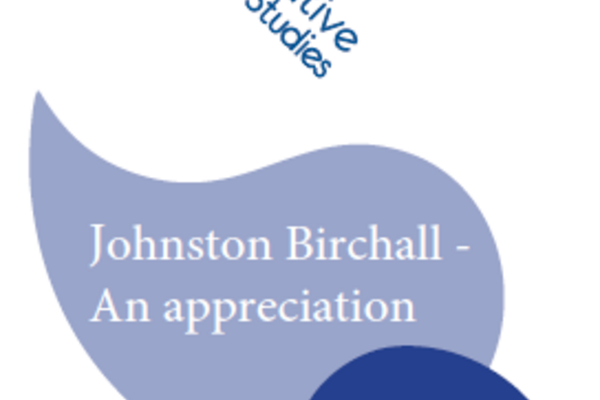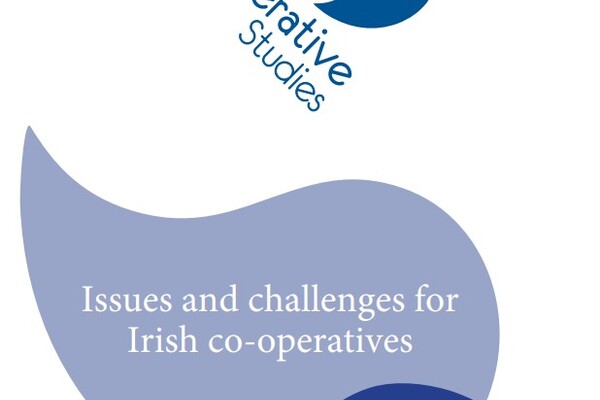Journal of Co-operative Studies, 55(1) - No. 164
Johnston Birchall had a long association with UKSCS as a board member, vice-chair and secretary, then as editor of the Journal for five years before becoming part of the editorial advisory board. During that time, he left a legacy of research papers, policy documents, articles, and commentaries on public policy, co-operatives and mutuals locally, nationally, and internationally. A year after his death, this special issue of the Journal commemorates and celebrates Johnston Birchall’s huge contribution to both UKSCS and the co-operative movement.
The span of articles in this special edition shows how Johnston carried co-operation with him as a constant companion throughout his life, offering astute perspectives on whatever context he found himself in. From a family connection with small shops, to his role as manager in a housing association, to his career as an academic researcher of co-operatives and co-operation, Johnston was always able to offer fresh insights and, where appropriate, challenge existing orthodoxies. He had an uncanny knack of seemingly knowing what was coming next before it arrived, so that he always had something to say when it did. And he often said it first here, in the Journal of Co‑operative Studies, a journal that he contributed to and edited with great pride.
Professor Richard Simmons, University of Stirling (p6, editorial)
Appreciation and commemoration
Short papers (editorial review)
![]() Johnston Birchall - An appreciation
Johnston Birchall - An appreciation
Ed Mayo, pp. 7-9
![]() Johnston Birchall - A giant of co-operative scholarship
Johnston Birchall - A giant of co-operative scholarship
Nick Matthews, pp. 10-12
Sonja Novkovic, pp. 13-14
![]() My friendship with Johnston Birchall
My friendship with Johnston Birchall
Akira Kurimoto, p. 15
Journal of Co-operative Studies Papers by Johnston Birchall 1984-2011
![]() Workers co-operatives — Some prospects. Rescue for small co-op shops
Workers co-operatives — Some prospects. Rescue for small co-op shops
R. Johnston Birchall, pp. 17-20
![]() Consumer co-operative societies: Why should people participate?
Consumer co-operative societies: Why should people participate?
R. Johnston Birchall, pp. 21-25
![]() Housing co-operatives: How successful are they?
Housing co-operatives: How successful are they?
R. Johnston Birchall, pp. 26-31
![]() Co-operation between co-operatives: Pious hope or sound strategy?
Co-operation between co-operatives: Pious hope or sound strategy?
R. Johnston Birchall, pp. 32-37
![]() The fall and rise of the small co-operative store. “Save our shop” - updated
The fall and rise of the small co-operative store. “Save our shop” - updated
R. Johnston, Birchall, pp. 38-48
![]() Government policy and social housing. Dangers and opportunities in the Bill.
Government policy and social housing. Dangers and opportunities in the Bill.
R. Johnston Birchall. pp. 49-53
![]() Social and co-operative housing: The new act.
Social and co-operative housing: The new act.
R. Johnston Birchall, pp. 54-57
![]() Housing co-operatives in crisis
Housing co-operatives in crisis
Johnston Birchall, pp. 58-62
![]() Neither public nor private: The co-operative third way.
Neither public nor private: The co-operative third way.
Johnston Birchall, pp. 63-68
![]() Co-operative values and principles: A commentary.
Co-operative values and principles: A commentary.
Johnston Birchall, pp. 69-83
![]() The Lanica affair: An attempted takeover of a consumer co-operative society.
The Lanica affair: An attempted takeover of a consumer co-operative society.
Johnston Birchall, pp. 84-93
![]() Co-operatives in the twenty-first century.
Co-operatives in the twenty-first century.
Johnston Birchall, pp. 94-100
![]() Creating and supporting co-operative members in the West Midlands
Creating and supporting co-operative members in the West Midlands
Richard Simmons and Johnston Birchall, pp. 101-117
![]() The role and potential of co-operatives in the poverty reduction process: A research agenda
The role and potential of co-operatives in the poverty reduction process: A research agenda
Johnston Birchall and Richard Simmons. pp. 118-128
![]() Co-operatives and poverty reduction: Findings from a research project
Co-operatives and poverty reduction: Findings from a research project
Richard Simmons and Johnston Birchall, pp. 129-133
![]() The ‘mutualisation’ of public services in Britain: A critical commentary.
The ‘mutualisation’ of public services in Britain: A critical commentary.
Johnston Birchall, pp. 134-147
![]() A ‘member-owned business’ approach to the classification of co-operatives mutuals.
A ‘member-owned business’ approach to the classification of co-operatives mutuals.
Johnston Birchall, pp. 148-161
Building on a legacy
Flying below the radar: England’s early co-operative and co-partnership tenant societies today
Andrew Bibby, pp. 162-173
Johnston Birchall - A bibilography.
Collated by Jan Myers, UKSCS, pp. 175-180
Cooperative firms, participatory culture, and contemporary challenges. Essays in honour of Johnston Birchall
Special issue of the Journal of Entrepreneurial and Organizational Diversity, 2023, Vol 12, Issuse 2.
Guest editors: Silvia Sacchetti, Lou Hammond Ketilson, and Carlo Borzaga










